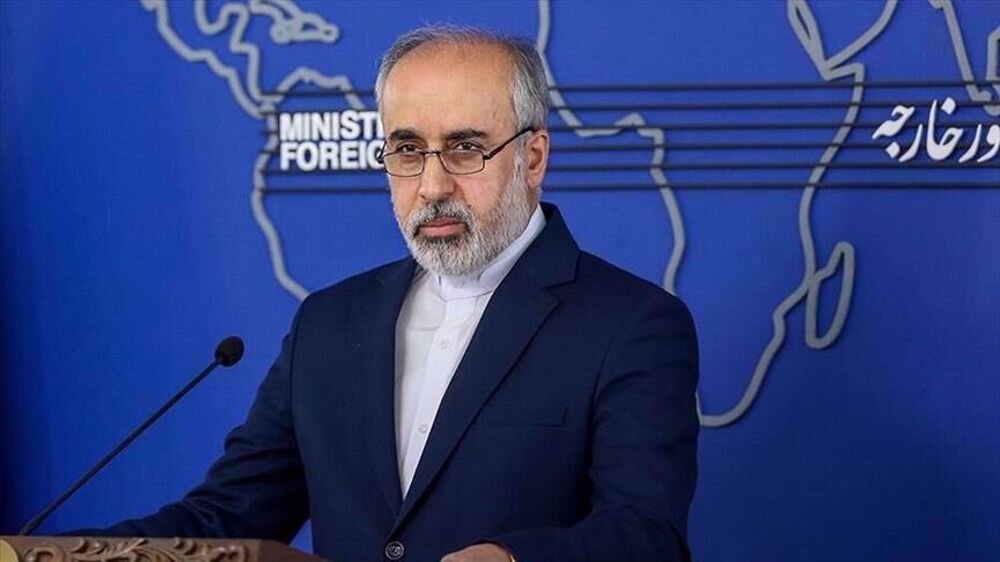‘Killing of journalists stigma on the face of Israeli regime’

TEHRAN- Iran has vehemently condemned the assassination of journalists by the Israeli regime in the Gaza Strip, stating that the killings do not excuse the atrocities committed by the Zionist regime and its allies.
The comments were made by Foreign Ministry spokesman Nasser Kanaani on Tuesday in a post on X following the revelation that up to now 23 journalists have been murdered in the Israeli regime’s continuing attacks on Gaza Strip.
“Killing journalists does not absolve the Zionist regime and its leaders stand as war criminals, and those who support them are entwined in these transgressions,” he pointed out.
Kanaani described the Israeli atrocities as an ignominious blot that shall forever be a stain on the visage of the Zionist regime and its backers.
“In the face of such manifold atrocities, no awakened conscience can remain mute,” he concluded.
Roshdi Sarraj is the 23rd journalist killed in Gaza
On Sunday, Israel launched an air strike on the Tel al-Hawa neighborhood in Gaza City, killing Palestinian journalist Roshdi Sarraj.
According to local news agency WAFA, the bombing of Tel al-Hawa was among many raids carried out by the Israeli army on various areas of the Gaza Strip.
Roshdi’s apartment was damaged in the first week of the war and, along with his wife Shorouq and one-year-old daughter Dania, he moved to the family home in Tel al-Hawa.
“The Israelis were bombing our area with no let-up,” said Yahya al-Sarraj, Roshdi’s father and municipal mayor of Gaza City. “Roshdi tried to shield his wife and daughter when the Israeli air raid struck.”
The family home was severely damaged, but the 10 family members there survived, except Roshdi, who was hit by shrapnel.
Al-Sarraj praised his son’s courage and bravery.
Roshdi considered it his life’s work to convey the reality of what is happening in Gaza, which he loved fiercely despite the Israeli occupation’s suffocating policies on the territory.
“He was supposed to go to Qatar for a work trip after he performed umrah in Mecca,” al-Sarraj said. “But when the Israeli aggression began he immediately cancelled and came back to Gaza.”
Roshdi refused to leave Gaza City and go to the south, his father added, adamant in “staying put, saying he will not be displaced, and writing on his social media accounts that the only way he would leave Gaza would be to go to heaven”.
“He cared about the truth,” al-Sarraj continued. “Since the war began, he was involved in digging people out from under the rubble with his bare hands, including two physically handicapped girls.”
Roshdi started his career as a journalist around 2012, his friend and fellow journalist Hosam Salem told Al Jazeera. Originally a photo-reporter, he co-founded Ain Media, a private media company in Palestine, that year with Yaser Murtaja.
Murtaja was shot dead by an Israeli sniper five years ago while covering the 2018 Great March of Return protests in the Gaza Strip, wearing his full press gear.
Roshdi formerly worked as a photographer for the United Nations Relief and Works Agency for Palestine Refugees (UNRWA), was a fixer in Gaza for several international news agencies, including Radio France, and produced a short film with Amnesty International.
Roshdi’s death troubled both the local and international community, prompting a stream of grieving tributes on social media that praised him as a friend and as a professional.
Ain Media released a statement, calling him a “brilliant photojournalist and film-maker”.
“Gaza is life,” Ain Media said in a post on X. “Roshdi and Yaser are life: they gave voice to the people of Gaza, to their smiles, to the stories locked in fear, to hopes cherished secretly from the oppression of the Israeli occupation.”
